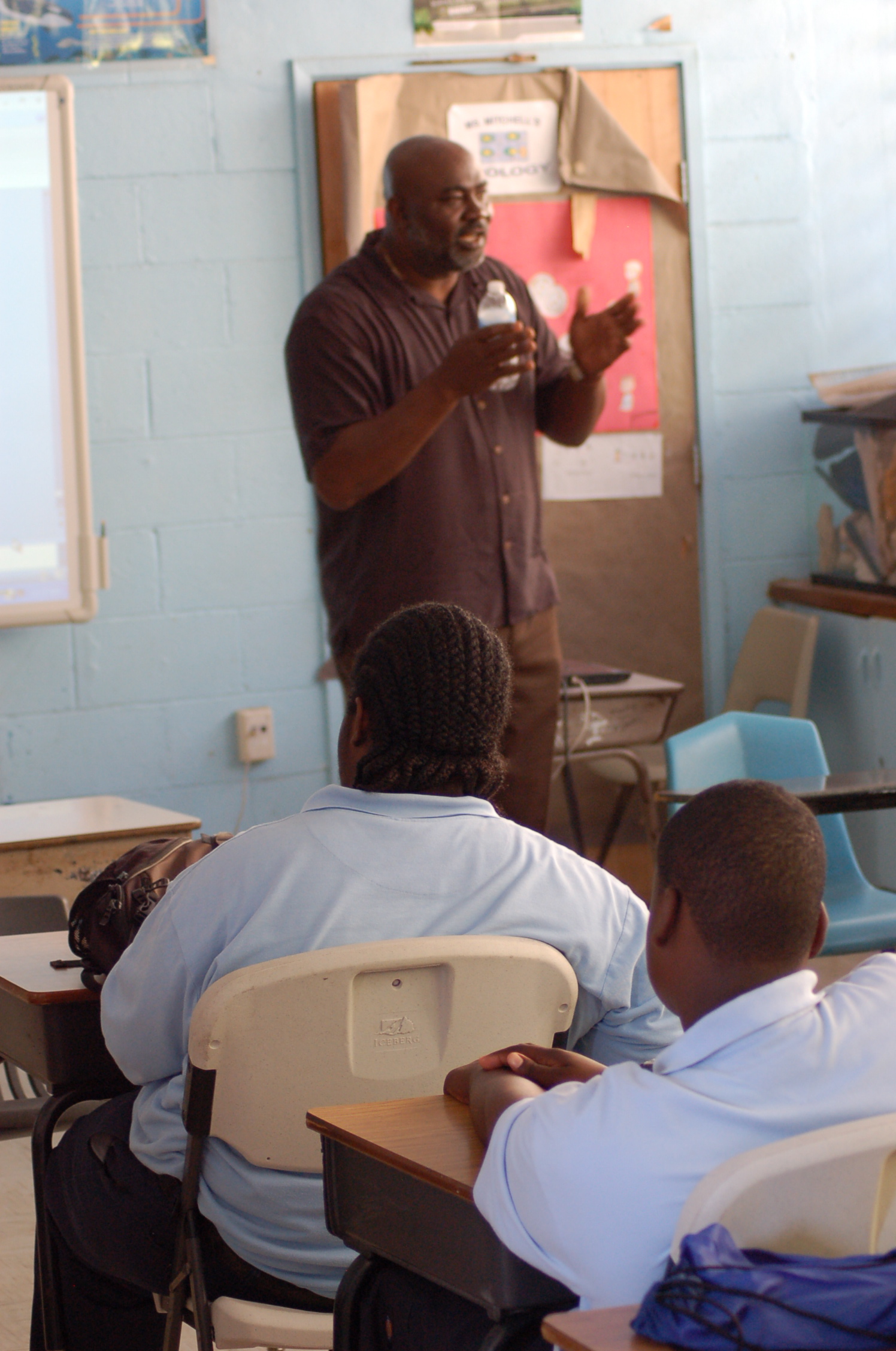
First there was college, where he studied biology. Then a master’s degree in wildlife ecology and ultimately a Ph.D. in fisheries science, with lots of work and research in the intervening years.
Now Jennings works as a research fishery biologist with the U.S. Geological Survey and as an adjunct professor of fisheries at the University of Georgia. But on Monday he headed back to his alma mater to see if he might inspire students there to pursue a career path similar to his.
Jennings, who lives near Atlanta, is the latest guest speaker on the Celebrity Scientists Tour, a recurring series organized by UVI’s VI-EPSCoR (V.I. Experimental Program to Stimulate Competitive Research).
During his 20-minute presentation to Vernon Callwood’s 9th- and 10th-grade science class, Jennings acknowledged to the students that he never thought he would end up as a scientist, but is glad he took the less-traveled road.
"I’m hoping my visit today lets you know that this type of work exists, because I didn’t know it existed at your age," he said. "I was going to play football in college, then major in P.E. and maybe come back to St. Thomas to be a coach."
But a senior-year trip to the mangroves of St. Thomas and a summer internship with the Department of Conservation and Cultural Affairs (as DPNR was then known) changed his mind.
Ever since, Jennings has had a love affair with the natural resources of the Virgin Islands, which he proudly showed dozens of slides of.
"When I was a kid there was a saying in the Virgin Islands—that it was so beautiful the angels would pause to rest here," he said, while scrolling through images of the unique birds, fish, reptiles, rodents and mammals that inhabit the terrestrial and undersea worlds.
"There’s lots of wildlife here that unfortunately we drive right past," he said.
Jennings admitted that since his was an unlikely career choice, some members of his family did not necessarily understand his decision to pursue marine sciences at first.
"My aunt said ‘People go to college to study fish?’" he quipped.
He added that the lack of knowledge of what marine scientists do and what kinds of jobs they can get hinders people from entering the field. In fact, when Callwood polled the 15-or-so students to ask what kind of careers they hoped to have in the future, many said they wanted to be doctors, football players, psychologists or teachers, but no one mentioned science.
Other obstacles to entry into the field include the lack of role models and the lack of available jobs in the territory for trained scientists. Jennings noted that only 2 percent of the U.S. population has Ph.D.s, and only 10 percent of the U.S. population is black, which equates to an extremely small number of blacks with Ph.D.s.
"My challenge to you is to ask which of you is going to have your name on a building due to your contribution to marine science?" Jennings asked, referring to prominent V.I. citizens whose names grace various government buildings.
As far as V.I. job opportunities, Jennings admitted that there are not many for marine scientists and that many highly educated residents end up taking jobs in the mainland U.S.
But he said that in addition to seeking employment with agencies, such as the DPNR, those with entrepreneurial spirit could create their own opportunities if they were so inclined, especially in the area of eco-tourism.
"People are willing to pay top dollar for good eco-tourism excursions," Jennings said, such as the mangrove kayaking, hiking, and snorkeling tours offered on St. Thomas. "But your interest is the limit."
Nicolas Drayton, who is a program coordinator for VI-EPSCoR, added that science can be studied on its own, or combined with other career interests to create an inter-disciplinary career path.
"You may say to yourself ‘I don’t want a career in science, I want to be a writer,’ but there is a need for writers in the science world as well," Drayton said. "Science needs people who are good communicators; for example, people who can translate scientific writings into layman’s terms."
Drayton added that the university, which offers both bachelor’s and master’s degrees in marine science, is building more capacity in the science department to try to encourage enrollment. He offered to help students get summer internships in the field of marine sciences, if they were so inclined.
The major goal of VI-EPSCoR ,which is funded by a five-year $11.5 million research infrastructure improvement grant from the National Science Foundation, is to increase the number of V.I. students entering into the fields of science, technology, engineering and math by strengthening their interest, research skills and intellectual development.
The staff of VI-EPSCoR hope that Jennings’ presentations will be eye opening, and will encourage more young people to consider a career path such as his.
In addition to speaking at CAHS, Jennings is also scheduled to speak to students in St. Croix and St. John during his weeklong visit.
Other scientists who have visited the territory as part of the Celebrity Scientists Tours are Dr. David Guggenheim, aka "The Ocean Doctor"; Dr. Debbie Berebichez, aka "The Science Babe"; and V.I. native Trika Gerrard, a marine ecologist with the National Oceanic and Atmospheric Administration (NOAA).
The visiting scientists are experts in their fields and each has committed to mentoring at least two students who show particular interest and potential in the scientists’ area of expertise. The scientists will provide networking opportunities, academic guidance, and information on workshops and conferences to their protégés.